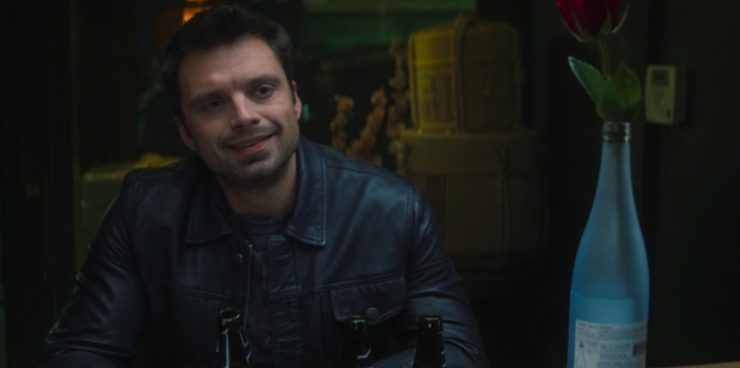Okay, so The Falcon and the Winter Soldier is over now. And it did some things well, and it tried to do some things well, and it did certain things terribly while wholeheartedly believing that it did them well. This is the nature of the Beast—the “beast” in this case being the MCU and pretty much every other franchise owned by a megacorp like Disney.
But now that it’s over, I have a bone to pick with James Buchanan Barnes, and everybody’s gonna hear about it.
Some spoilers ahead.
I was hoping that this particular issue would actually get addressed by the end of the show, but the final episode came and went, and nothing happened, so here I am about to complain to you that Bucky Barnes is a terrible date. And I expect a fair share of eyerolls, and a lot of “who cares?” or “obviously”s issued in response to that, and that’s where you’re wrong. Because this is a thing in television, and it’s pretty dangerous to perpetuate without thinking about how it comes off to your audience.
Here’s the scenario, in case you need a memory jog: Bucky has weekly lunches with an elderly fellow named Yori Nakajima because he can’t quite bring himself to confront the man about the fact that he murdered his son while he was the Winter Soldier. At their usual lunch spot, Mr. Nakajima notices Bucky’s interest in their server, Leah, and sets them set up on a date despite his protestations.
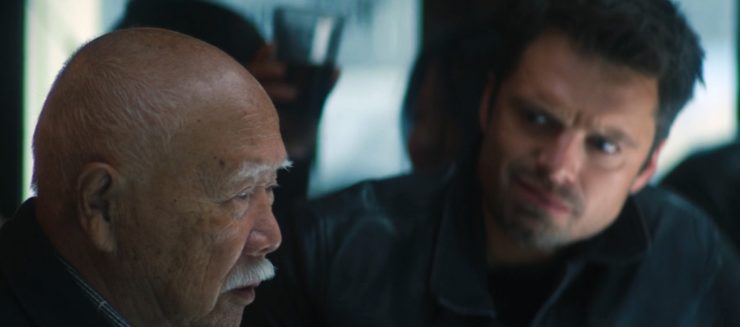
The next night, Bucky arrives with flowers, and he and Leah sit down after her shift in the restaurant to get to know each other. Leah asks a series of benign questions to facilitate that, and Bucky is visibly uncomfortable, giving answers that seem awkward (the fact that he’s actually 106 years old, his discomfort with online dating), or lying outright (stating that he wears gloves for “poor circulation” when he’s trying to hide his metal arm). Leah suggests a game as a further icebreaker, and they start up a drinking round of Battleship. When she jokes that she’s reading his mind to find the location of her next target, Bucky says “Please don’t.” Leah asks about Bucky’s siblings, his relationship to his parents, then mentions that she thinks it’s sweet that he spends time with Yori—the man has been having trouble since the death of his son, and not knowing how he died is particularly difficult. Bucky gets upset, and immediately departs their date without a word of explanation, leaving Leah alone.
When we watch something like this, we’re supposed to worry about Bucky because he’s a main character, and thus the scene is tied to his point of view. He’s the character we’re familiar with, and so we know why these questions are hard for him to answer, and why he’s suddenly so triggered that he has to flee the date without so much as an apology or faked excuse. We are not encouraged to notice the opposite side to this encounter—a woman who put herself into a vulnerable position, and by all accounts just had a date with a total creep.
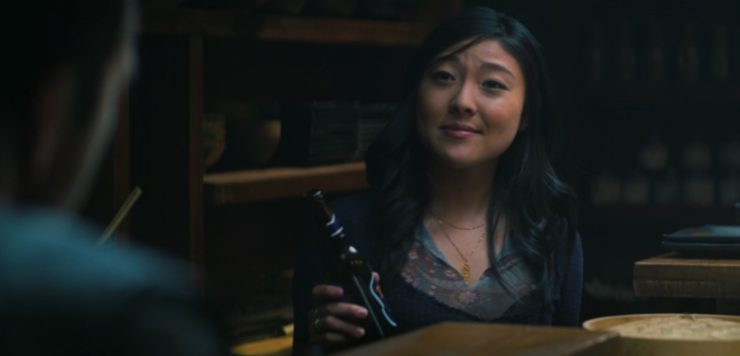
Because that’s how Bucky’s behavior comes off without context: he’s shifty, he’s unhappy, he has a hard time answering direct questions, he makes a point of saying that he doesn’t want his mind read, thereby indicating that he has something to hide. He wears black leather gloves and tries to pass off the “poor circulation” excuse as though it sounds viable or realistic. (My hands get cold a lot too, dude, and I don’t wear black leather gloves everywhere, even when it’s a readily apparent not-weird option, and despite the fact that I own a pair.) Then he bolts the instant you bring up something heartfelt and sad.
If that was your date, you wouldn’t think, gee, I hope that poor guy’s okay. You’d think, gee, I’m pretty sure that guy was a serial killer and I somehow just avoided getting murdered.
It would be bad enough just to see it here, but this scene is common enough that you could call it a staple in TV and film. Supernatural’s Sam Winchester gets strong-armed into a date with a young restaurant worker named Lindsay, who assumes that his avoidant behavior is down to him being a former addict like herself. (She doesn’t know said addiction was to demon blood instead of something normal, say, cocaine.) On Being Human, Hal is too awkward to avoid his date with Alex, so he recruits chaperones and tries to avoid ever being alone with her. (If he behaves strangely, you should probably always assume it’s because he’s a vampire.) Superheroes have prime real estate in this sort of scenario, usually because they’re trying to avoid giving away their super-identity. (Clark Kent, Peter Parker, Matt Murdock, Fenton Crackshell, the list goes on for guys who think they’re somehow hiding how distracted and guilty they feel for attempting to have a normal life with everyday priorities like making out with someone cute.)
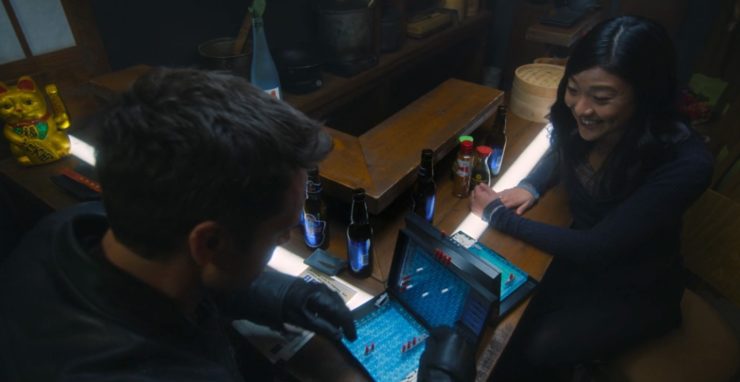
The problem with these scenes, conversely played either for laughs or wrenching emotion, is that they ignore one sweeping, simple truth—that women are always on guard for strange behavior from men on dates for the sake of self-protection. Because if they aren’t vigilant, their safety is at risk. Inevitably, watching these scenarios becomes an exercise of suspension in disbelief because you know that most women would never let a situation like that continue. You keep having to explain to yourself why she hasn’t gotten a strange “emergency” phone call, or excused herself to the bathroom, or finally pressed pause to let the guy know… sorry, it’s not you, it’s me. I should go.
There are a number of oddities around Bucky’s date that strain credulity, and require additional assumptions to make it play realistically. For one, I’m going to assume that Leah owns that restaurant if she feels comfortable having a date in it after closing with no customers around. I’m also going to assume that the kitchen staff are still cleaning up in the back, so she’s not totally alone with a relative stranger. (Bucky and Mr. Nakajima visit her place of employment frequently enough that they have a “usual” order, but that’s not the same as spending one-on-one time with another person.) I’m going to assume that Leah knows Yori quite well, and that they’ve maybe talked about Bucky when he wasn’t around, so she has reason to believe she can trust him. But none of these things are blatantly suggested by the script—I’m just filling in gaps to be less bothered watching a scene where I know very few women would stick around.
It comes with little surprise to note that these dates are nearly always written by men—the interiority of these women often don’t seem to matter much during these scenes. They are plot points, or they are prisms by which a male character can have his difficulties refracted back at him. He will learn or confront something, and she will probably cease to exist, at least from a narrative standpoint. If she does learns something (as is true for Lindsay and Alex), it’s likely that she should have been a smarter girl who knew to be afraid. But more often than not, this woman is the story equivalent of a very beautiful stepping stone on the path to character development.
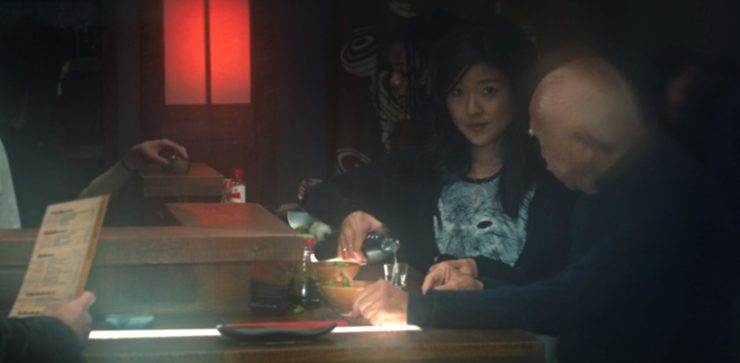
And this was true for the end of Falcon and the Winter Soldier: After Bucky finally confesses to Mr. Nakajima that he is the one who killed his son, he looks in on the man having lunch. Leah is sitting there next to the old man as he eats alone, and she sees Bucky through the restaurant window. Her expression is impossible to qualify in that moment because it doesn’t track with the possibilities on offer; if Yori didn’t tell her what Bucky did, she would undoubtedly be confused as to why he wasn’t inside having lunch with his friend; if Yori did tell her that Bucky admitted to killing his child, she’d likely be angry on his behalf that Bucky was sniffing around the place. But this moment doesn’t exist to serve either of their characters, it exists to serve Bucky—he gets to see that Mr. Nakajima is getting on with his life and Leah is still around to look after him. It’s meant to be a small comfort to a man who has done the terrible work of admitting once again everything that the Winter Soldier identity has stolen from him.
It sets a bad example on more than just a narrative front, however. Because the ubiquitous nature of this setup suggests to women and girls that maybe the man who’s acting weird on their date? Well, he could be a superhero who’s trying to recover from a tragic backstory. At the very least, he’s probably a sweet guy who just needs to be drawn out of his shell with some drunken boardgame-playing. And that’s not a message that anyone should internalize—because the stakes are too high if you’re wrong.
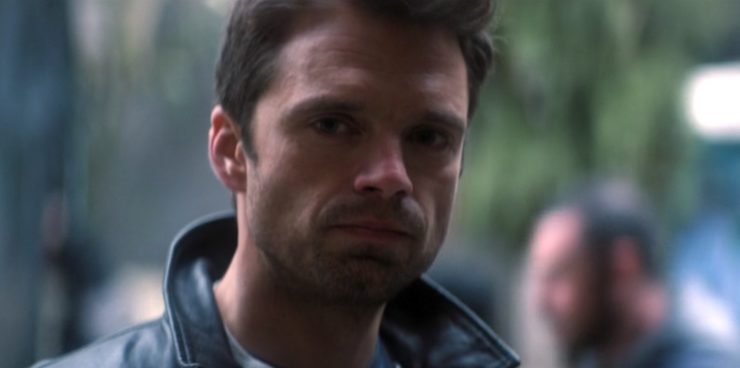
So I hope this trope works its way into retirement. And I hope that the next time Bucky Barnes decides to go on a date, he leads with being honest about his past—prosthetic arm and all.
Emmet Asher-Perrin would absolutely lead on dates with their extremely impressive vibranium arm, if they happened to have one. You can bug them on Twitter, and read more of their work here and elsewhere.










